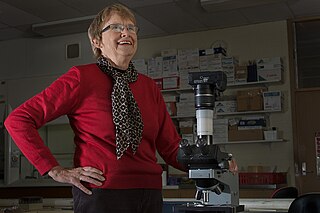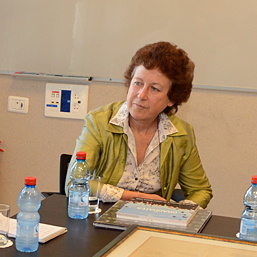
A volcanologist, or volcano scientist, is a geologist who focuses on understanding the formation and eruptive activity of volcanoes. Volcanologists frequently visit volcanoes, sometimes active ones, to observe and monitor volcanic eruptions, collect eruptive products including tephra, rock and lava samples. One major focus of inquiry in recent times is the prediction of eruptions to alleviate the impact on surrounding populations and monitor natural hazards associated with volcanic activity. Geologists who research volcanic materials that make up the solid Earth are referred to as igneous petrologists.

Biomineralization, also written biomineralisation, is the process by which living organisms produce minerals, often resulting in hardened or stiffened mineralized tissues. It is an extremely widespread phenomenon: all six taxonomic kingdoms contain members that are able to form minerals, and over 60 different minerals have been identified in organisms. Examples include silicates in algae and diatoms, carbonates in invertebrates, and calcium phosphates and carbonates in vertebrates. These minerals often form structural features such as sea shells and the bone in mammals and birds.
Ann Henderson-Sellers is an Emeritus Professor of the Department of Environment and Geography at Macquarie University, Sydney. She was the Director of the Joint Planning Staff (JPS) of the World Climate Research Programme in 2006 and 2007 and was the Director of the Environment Division at ANSTO from 1998 to 2005. She was the Deputy Vice-Chancellor of The Royal Melbourne Institute of Technology from 1996–1998. Prior to this she was the founding director of the Climatic Impacts Centre at Macquarie University where she continues to hold a Professorship in Physical Geography.

The Eureka Prizes are awarded annually by the Australian Museum, Sydney, to recognise individuals and organizations who have contributed to science and the understanding of science in Australia. They were founded in 1990 following a suggestion by science journalist Robyn Williams.

Andrew John Pitman is a British-Australian atmospheric scientist.

Professor Kurt Lambeck AC, FRS, FAA, FRSN is Professor of Geophysics at the Australian National University in Canberra, Australia. He has also taught at University of Paris and at Smithsonian and Harvard Observatories.

Jillian Fiona Banfield is professor at the University of California, Berkeley with appointments in the Earth Science, Ecosystem Science and Materials Science and Engineering departments. She leads the Microbial Research initiative within the Innovative Genomics Institute, is affiliated with Lawrence Berkeley National Laboratory and has a position at the University of Melbourne, Australia. Some of her most noted work includes publications on the structure and functioning of microbial communities and the nature, properties and reactivity of nanomaterials.
Sharon Mosher is an American geologist. She did her undergraduate work at University of Illinois Urbana-Champaign. After earning an MSc from Brown University, she returned to the University of Illinois to get her PhD in Geology in 1978. Since 2001 she has held the William Stamps Farish Chair at University of Texas, and, since 2009 she has served as the dean of the Jackson School of Geosciences at Texas. In 2013 she became the president of the American Geosciences Institute.

Nerilie Abram is an Australian professor at the ANU Research School of Earth Sciences, Australian National University, Canberra, Australia. Her areas of expertise are in climate change and paleoclimatology, including the climate of Antarctica, the Indian Ocean Dipole, and impacts on the climate of Australia.

Leanne Armand was an Australian professor of marine science. She was an expert in the identification of diatoms in the Southern Ocean. She was known for her contributions to the understanding of past Southern Ocean dynamics and sea ice as a result of her knowledge of diatom distributions and ecology.

Elizabeth Marchant Truswell is a former Chief Scientist at the Australian Geological Survey Organisation and is known for her application of recycled palynomorph distribution as an indicator of sub-ice geology.
Kenton Stewart Wall Campbell, known as Ken Campbell, was an Australian palaeontologist and academic. Campbell was born in Ipswich, Queensland. He was the son of two store clerks who moved their family to Boonah during the Great Depression. He attended primary school in Ipswich, Boonah and Coorparoo. After winning a scholarship to attend Brisbane Grammar School in 1940, Campbell went on to university. In 1945, Campbell entered his second year of his study, attending lectures given by Dr Dorothy Hill, who had returned from World War II service in the WRANS. Her academic rigour inspired him. He took his B.Sc. with Honours from the University of Queensland in 1949 on her advice, followed by his M.Sc. in 1951 and PhD in 1958. His research was in Permian brachiopods of the Bowen and adjacent basins.
Maggie Cusack is a Scottish academic and administrator who has been the inaugural president of Munster Technological University since 1 January 2021. She was previously Professor of Biomineralisation at the School of Geographical and Earth Sciences at the University of Glasgow. Her central research focuses on biominerals On Thursday 10 December 2020, it was announced by Ireland's Minister for Further and Higher Education, Research, Innovation and Science Simon Harris that Maggie was to become the inaugural president of Munster Technological University once it is founded on 1 January 2021.

Lia Addadi is a professor of structural biology at the Weizmann Institute of Science. She works on crystallisation in biology, including biomineralization, interactions with cells and crystallisation in cell membranes. She was elected a member of the National Academy of Sciences (NAS) in 2017 for “distinguished and continuing achievements in original research”, and the American Philosophical Society (2020).

Patricia Martin Dove is an American geochemist. She is a university distinguished professor and the C.P. Miles Professor of Science at Virginia Tech with appointments in the department of Geosciences, department of Chemistry, and department of Materials Science and Engineering. Her research focuses on the kinetics and thermodynamics of mineral reactions with aqueous solutions in biogeochemical systems. Much of her work is on crystal nucleation and growth during biomineralization and biomaterial interactions with mineralogical systems. She was elected a member of the National Academy of Sciences (NAS) in 2012 and currently serves as chair of Class I, Physical and Mathematical Sciences.
Penelope King uses geochemistry and cosmochemistry to study planetary processes to better understand past and future planetary environments, and what this information may tells us about climate change. She is a professor at the Australian National University (ANU) in the Research School of Earth Sciences (RSES). King holds many awards, including Fellow of the American Geophysical Union and the Mineralogical Society of America in 2019, and winning the AGU Joanne Simpson Medal for Mid-Career Scientists the same year. She currently leads a research group examining surface and interior processes on planetary bodies.
Loeske E. B. KruukFRS is an evolutionary ecologist who is a Royal Society Research Professor at the University of Edinburgh. She was awarded the 2018 European Society for Evolutionary Biology President's Award. In 2023, she was elected as a Fellow of the Royal Society.
Lidia Morawska is a Polish–Australian physicist and distinguished professor at the School of Earth and Atmospheric Sciences, at the Queensland University of Technology and director of the International Laboratory for Air Quality and Health (ILAQH) at QUT. She is also co-director of the Australia-China Centre for Air Quality Science and Management, an adjunct professor at the Jinan University in China, and a Vice-Chancellor fellow at the Global Centre for Clean Air Research (GCARE), University of Surrey in the United Kingdom. Her work focuses on fundamental and applied research in the interdisciplinary field of air quality and its impact on human health, with a specific focus on atmospheric fine, ultrafine and nanoparticles. Since 2003, she expanded her interests to include also particles from human respiration activities and airborne infection transmission.
Brigid R. Heywood, born 1956 or 1957, is a British/Australian academic and biological scientist. She was Vice-Chancellor of the University of New England (UNE) in Australia from 2019 until she resigned after criminal charges were laid against her in 2022.

Rosalind Mary Coggon is an English scientist who is a Royal Society University Research Fellow at the University of Southampton. She is the co-editor of the 2050 Science Framework, which guides multidisciplinary subseafloor research. She was awarded the 2021 American Geophysical Union Asahiko Taira International Scientific Ocean Drilling Research Prize.











